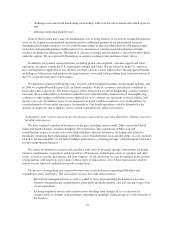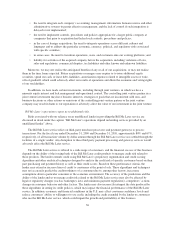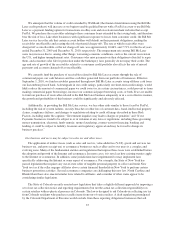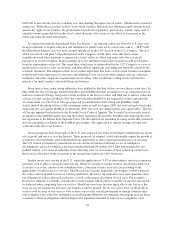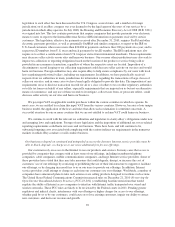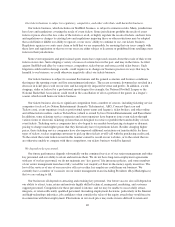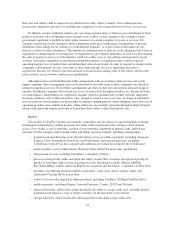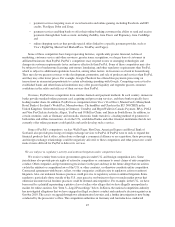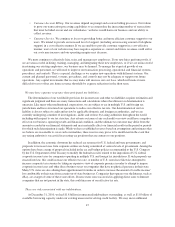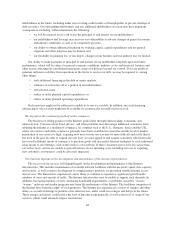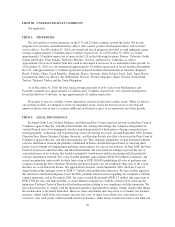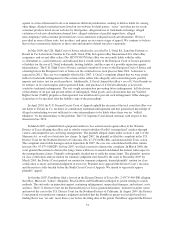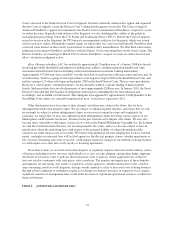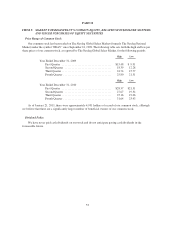eBay 2010 Annual Report Download - page 50
Download and view the complete annual report
Please find page 50 of the 2010 eBay annual report below. You can navigate through the pages in the report by either clicking on the pages listed below, or by using the keyword search tool below to find specific information within the annual report.• payment services targeting users of social networks and online gaming, including Facebook and Hi5
credits, PlaySpan, Boku and Zong;
• payment services enabling banks to offer their online banking customers the ability to send and receive
payments through their bank account, including ZashPay from Fiserv and Popmoney from CashEdge;
and
• online shopping services that provide special offers linked to a specific payment provider, such as
Visa’s RightCliq, MasterCard MarketPlace, TrialPay and Tapjoy.
Some of these competitors have longer operating histories, significantly greater financial, technical,
marketing, customer service and other resources, greater name recognition, or a larger base of customers in
affiliated businesses than PayPal. PayPal’s competitors may respond to new or emerging technologies and
changes in customer requirements faster and more effectively than PayPal. Some of these competitors may also
be subject to less burdensome licensing, anti-money laundering, and other regulatory requirements than PayPal,
which is subject to additional regulations based on, among other factors, its licensure as a bank in Luxembourg.
They may devote greater resources to the development, promotion, and sale of products and services than PayPal,
and they may offer lower prices. For example, Google Checkout has offered free payments processing on
transactions in an amount proportionate to certain advertising spending with Google. Competing services tied to
established banks and other financial institutions may offer greater liquidity and engender greater consumer
confidence in the safety and efficacy of their services than PayPal.
Overseas, PayPal faces competition from similar channels and payment methods. In each country, numerous
banks provide standard online payment card acquiring and processing services, and these banks typically have
leading market share. In addition, PayPal faces competition from Visa’s Visa Direct, MasterCard’s MoneySend,
Royal Bank of Scotland’s World Pay, Moneybookers, ClickandBuy and Ukash in the EU; NOCHEX in the
United Kingdom; Sofortüberweisung in Germany; CertaPay and HyperWallet in Canada; Paymate, BPay, POLI
and Visa PayClick in Australia; Alipay, YeePay and 99 Bill in China; and Inicis in South Korea. In addition, in
certain countries, such as Germany and Australia, electronic funds transfer is a leading method of payment for
both online and offline transactions. As in the U.S., established banks and other financial institutions that do not
currently offer online payments could quickly and easily develop such a service.
Some of PayPal’s competitors, such as Wells Fargo, First Data, American Express and Royal Bank of
Scotland, also provide processing or foreign exchange services to PayPal. If PayPal were to seek to expand the
financial products that it offers, either alone or through a commercial alliance or an acquisition, these processing
and foreign exchange relationships could be negatively affected, or these competitors and other processors could
make it more difficult for PayPal to deliver its services.
We are subject to regulatory activity and antitrust litigation under competition laws.
We receive scrutiny from various government agencies under U.S. and foreign competition laws. Some
jurisdictions also provide private rights of action for competitors or consumers to assert claims of anti-competitive
conduct. Other companies and government agencies have in the past and may in the future allege that our actions
violate the antitrust or competition laws of the U.S. or other countries, or otherwise constitute unfair competition.
Contractual agreements with buyers, sellers, or other companies could give rise to regulatory action or antitrust
litigation. Also, our unilateral business practices could give rise to regulatory action or antitrust litigation. Some
regulators, particularly those outside of the U.S., may perceive our business to have so much market power that
otherwise uncontroversial business practices could be deemed anticompetitive. For example, in the U.S., we have
been sued by a plaintiff representing a putative class of sellers who alleges that we have illegally monopolized a
market for online auctions. See “Item 3—Legal Proceedings” below. In Korea, the national competition authority
has investigated allegations that we have engaged in illegal exclusive conduct and rendered a decision against us in
October 2010. The case is on appeal through two administrative lawsuits, and a further investigation is now being
conducted by the prosecutor’s office. The competition authorities in Germany and Australia have conducted
45


